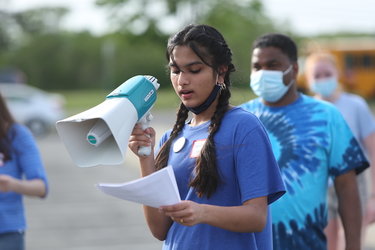Sabourin aims to have most comprehensive anti-hate policy in the country
GUILDERLAND — Before June graduation, the Guilderland schools hope to have a new anti-hate policy in place that encompasses every aspect of the district.
Nathan Sabourin, who chairs the school board’s policy committee, says he has written a 10-page, single-spaced draft as a starting point.
“I recognize that I am not the person that should probably be writing this …,” Sabourin told the school board at its Feb. 14 meeting. “If anybody can’t tell, I’m a white male, Anglo-Saxon, cisgender. So I’m not the right person to be doing this, but I am the person doing it because we’ve got to start somewhere.”
For the past two years, Guilderland students have organized an anti-hate rally in the spring at the high school where students aired their grievances and tried to educate their teachers, administrators, and peers.
At the same time, Guilderland hired its first director of diversity, equity, and inclusion, Matt Pinchinat, and formed a DEI committee.
Earlier this school year, students organized two separate walk-outs. The first, in October, centered on racism after an incident at a high school football game where a few students wore blackface. The second, in November, focused on sexism.
Sabourin, an attorney and parent of two Guilderland students, made his first run for school board in the spring of 2021 and was elected in a four-way race for three seats.
He said at that time he felt compelled to run after watching a school board meeting in which board members were discussing the school calendar. It seemed to him a simple matter to make Rosh Hashanah, the first of the Jewish High Holy Days, a school holiday. Sabourin noted he is not Jewish but “was quite frankly disturbed” with the views of some board members.
His primary goal, if elected to the board, he said, would be to continue the district-wide focus on diversity, equity, and inclusion.
On racism, Sabourin said, “We need … to stop denying what the truth is.” He credited school board President Seema Rivera for stating it “very clearly,” and he said “symbolic gestures” are not enough.
Sabourin also told The Enterprise during his campaign that the district needs a clear policy on equity, diversity, and inclusion and everyone from staff and board members to vendors and contractors should undergo training on bias.
“We can be a real actor for change,” he said, adding that Guilderland is lagging behind districts like Niskayuna.
On Feb. 14, Sabourin told the school board he would present the board with a rough draft of the new anti-hate policy for discussion at its March 8 meeting.
“Then that will be shared with the relevant stakeholders and most notably, obviously students, to get their feedback,” he said. He suggested an online ThoughtExchange would be set up to get responses from students.
His aim, Sabourin said, is to have a “more comprehensive plan than I have found in the state of New York, and certainly probably the most comprehensive in the country.”
The policy, he said, would “touch on virtually every aspect of the district.” He went on, “It is not going to be simply aspirational. It is going to have, for lack of a better term, teeth, and guidance. And it’ll be not just a policy, it will be a regulation within the district.”
Among the topics the policy will address, Sabourin said, are leadership and administration, hiring and retention, curriculum and instruction, athletics, training, professional development, enforcement, and investigations.
“It’s not going to be a stagnant policy, …” he said, “It’s going to be constantly evaluated and updated.”
Sabourin said the policy will address all forms of hatred — “not just anti-Black, but Islamophobia, anti-semitism, any ‘anti’ … the list is long.”
Board Vice President Kelly Person asked if that would include LGBTQ+, and Sabourin said it would.
“Our hope is that it will be different than the anti-discrimination policy that we already have,” said board member Blanca Gonzalez-Parker.
Board President Seema Rivera said it was important to have “students feel empowered and be part of the process” and that students would be the first to see where the policy is “just performative … a surface level versus actionable items” with decisions being made at the district level.
She also said, “Overall, the sentiment is to be more proactive, as opposed to being responsive to something or waiting till something happens.”
Person asked, “Will there be an opportunity for parents or teachers or administrators to also provide some input?”
“They can send us emails and show up for public comment and give us feedback,” Sabourin responded.
He went on, “I’ll be very frank; I consider this to be a very important missing piece in our district.”
He also said the policy would be a directive for processes like hiring and retention or professional development, meaning teacher training.
Many of the students involved in the anti-hate work are seniors this year, said Rivera, so it is important and symbolic “that we have this done by the time they graduate.”
Other business
In other business at the Guilderland School Board’s Feb. 14 meeting, the board:
— Heard from Rivera a request for an update on expanding school food options. Board member Rebecca Butterfield said that the DEI communications committee had talked about “having observances on the school calendar” and said it would “be really wonderful” if school lunch information could coordinate with that;
— Heard Rivera request that the practice of high school student representatives giving updates to the board be resumed. The practice had stopped during the pandemic shutdown. Wiles said she would talk to the high school principal about it;
— Heard from Butterfield, a pediatrician, that the state’s Office for Children and Family Services is launching new training for mandated reporters, most of whom are educational professionals.
A key focus of the new guidance is improved implicit bias training to prevent or reduce calls to the statewide central register based on race or poverty; the update will also include revamped materials to better understand adverse childhood experiences, known as ACEs, Buttefield said.
Mandated reporters, like teachers, will better be able to know when a family would be best supported by directing them to “culturally responsive community-based programs,” she said.
A family support line known as HEARS, which stands for for help empower, advocate, reassure, and support, can be called by anyone, Monday through Friday, from 8:30 a.m to 4:30 p.m., which can provide referrals for food, clothing, health care, and parenting education.
“It’s anonymous and anyone can call,” said Butterfield; the number is 888-554-3277;
— Heard a question from Gonzalez-Parker: Do coaches who are not faculty members receive training in DEI and anti-bullying?
“They have hazing training, not necessarily bullying,” said Regan Johnson, the district’s assistant superintendent for human resources, who formerly directed athletics. Wiles added that Pinchinat had trained student athletes and their coaches in the fall.
Gonzalez-Parker also asked if students who participated in musical groups received letters, or a similar form of recognition, the way athletes do. “I’m not sure,” said Wiles;
— Heard from Gonzalez-Parker that she had participated in Breakfast with the Principal at FMS during which Michael Laster had said a whipping app is being used by middle school students, which makes a noise like a cracking whip and in some instances leads students to hit other students. She said she wanted to get the word out to parents: “Please speak with your child about this app …. Let them know it’s not acceptable”;
— Heard from Assistant Superintendent for Curriculum and Instruction Rachel Anderson that the Farnsworth Middle School Mathcounts team earned third place at the Regional Chapter Competition held at General Electric and will head to the New York State Competition on March 4.
Two students, Jordan Baker and Dominique Zen, scored in the Top 12 to earn spots in the Countdown round, with Jordan taking third place. “It’s a really intense speed round and both students should be very proud,” said Anderson.
The team members, in addition to Baker and Zen, are Thomas Zhong, Roger Sheng, Brian Jiang, Hamsini Subramanian, Mark Shao, Ben Xu, Catherine Zhong, Aria Ferguson, Ashley Girard, and Rebecca Been;
— Heard from Wiles that the Guilderland girls’ indoor track-and-field team earned their first Division 1 Sectional Championship in school history on Feb. 4 at Shenendehowa High School. The team scored a total of 175 points, defeating second-place Saratoga, with 100 points, and Shenendehowa, with 99 points, along with the rest of the Division 1 field. The Dutch had a first-place finisher in a total of seven events;
— Heard from Wiles that Guilderland was one of 738 school districts recognized by the National Association of Music Merchants as among the Best Communities for Music Education in the United States.
Congressman Paul Tonko wrote in a congratulatory letter, “The selection of the Guilderland Central School District is the result of tireless dedication and commitment in teaching future musicians regardless of the obstacles that you have faced throughout the pandemic. Your hard work to keep music alive in the district is a testament to not only your student’s musical excellence, but the hard work and dedication of educators, families and the greater community”;
— Approved the appointment of Robert H. Greenwood for a special-education impartial hearing; and
— Met in executive session to receive legal advice from the school lawyer, to discuss a tenure appointment, to discuss someone’s employment history, and to discuss matters relating to potential litigation, according to the meeting agenda.



